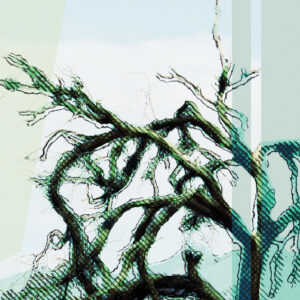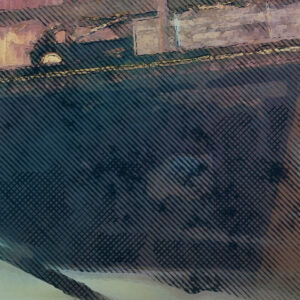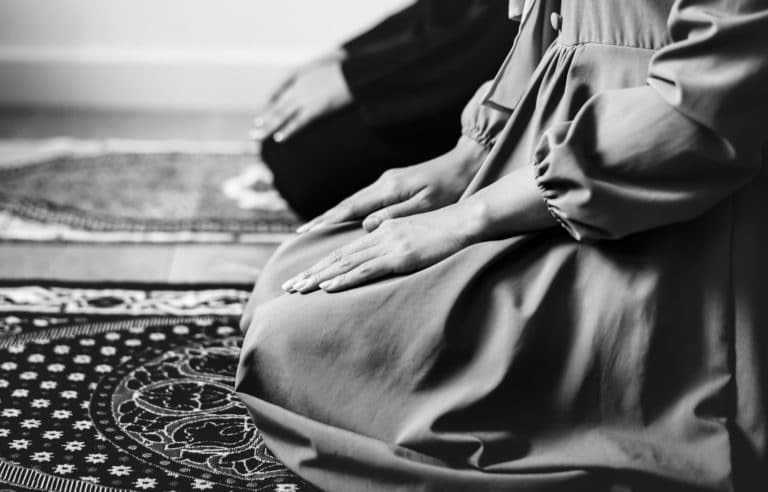Kate Bowler and Wajahat Ali
The Future of Hope
An irreverent conversation about hope between journalist Wajahat Ali and theologian Kate Bowler. They speak to this moment we’re in through the friendship they found on the edge of life and death that is cancer — Wajahat through his young daughter; and Kate with a stage 4 diagnosis at the age of 35 that she’s chronicled in a beloved memoir, Everything Happens for a Reason (And Other Lies I’ve Loved). Their conversation is rich with practical wisdom for facing uncertainty and mortality, losses we did not foresee, and new beginnings we would not have chosen.
This is the first in a new series, The Future of Hope — a beautiful array of voices, former guests on this show, having the conversations they want to be hearing in this time.
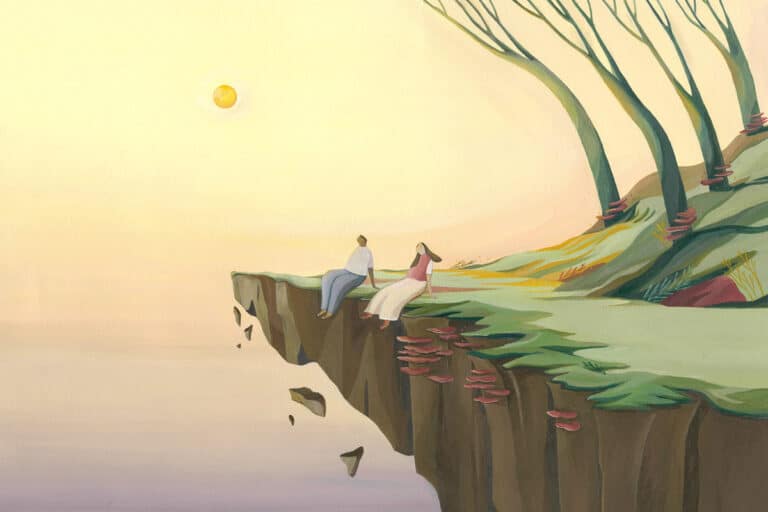
Image by Ifada Nisa, © All Rights Reserved.
Guests
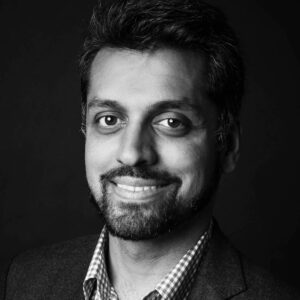
Wajahat Ali is a columnist at The Daily Beast and his essays, interviews, and reporting have appeared in The New York Times, The Atlantic, The Washington Post, and The Guardian. He also is a Senior Fellow at the Western States Center and Auburn Seminary. He wrote the celebrated play, The Domestic Crusaders. His first book, Go Back To Where You Came From: And Other Helpful Recommendations on How to Become American, will be published in early 2022.
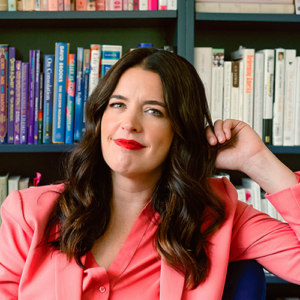
Kate Bowler is the author of several beloved books, including Everything Happens for a Reason (And Other Lies I’ve Loved) and most recently, The Lives We Actually Have: 100 Blessings for Imperfect Days. She is an associate professor at Duke Divinity School and made an early name in her field of American religious history with her 2013 book Blessed: A History of the American Prosperity Gospel. She also hosts the podcast Everything Happens.
Transcript
Krista Tippett, host: In this moment, I’m feeling called to walk alongside others to listen, ask, and lead in this space. So in the year ahead, about once a month, we are going to bring a beautiful array of voices, former guests on this show, engaging in conversations they want to be having. We’re calling this series The Future of Hope.
Today, as we get started: the esteemed journalist Wajahat Ali in an irreverent exploration of hope with theologian, writer, and podcaster Kate Bowler. These are two people I have long admired. Their friendship began when Waj, as he likes to be called, met Kate for an event with the Washington Post while his three-year-old daughter was enduring Stage 4 cancer. Kate, who had her own Stage 4 diagnosis at the age of 35, recognized the hospital bracelet he’d mistakenly left on, and she could tell from his face that he hadn’t slept all night.
Kate has an amazing ability to honor heartbreak and evoke smiles, at once — as in the very title of her utterly original book Everything Happens for a Reason (And Other Lies I’ve Loved). This conversation is rich in practical wisdom for these years in which we are all living on communal edges of facing uncertainty, mortality, losses we did not foresee, and new beginnings we would not have chosen. I’m Krista Tippett, and this is On Being.
[music: “Seven League Boots” by Zoë Keating]
In addition to her writing, Kate Bowler hosts the podcast Everything Happens. She is a professor in the History of Christianity at Duke Divinity School, where she started her academic career researching and writing about the prosperity gospel. Wajahat Ali’s essays, interviews, and reporting have appeared in many august publications. You might remember Waj’s younger voice in On Being’s beloved Ramadan show, so he’s a long time member of the On Being family.
Wajahat Ali: Thank you, Kate, for joining me to discuss the future of hope.
Kate Bowler: Hello, my friend. Yeah, let’s be hopeful today.
Ali: Yeah, and we’re having this conversation, which sounds like one of those things you put on a book, you buy a Hallmark card, your mother-in-law has printed on a painting right in the kitchen with another word that says Love & Happiness. And it makes you sound really good, but then when you have to live through it, in times which are painful, such as what you’re going through right now, what does the future of hope look like for you, as we are speaking today, and how do you reconcile that?
Bowler: Hope is so tricky, isn’t it. It’s so easily confused with optimism, I think. And as a historian who’s studied optimism [laughs] for a really long time, I think it’s always been hard for me to reconcile, how do you be someone like a person of hope, when your problems aren’t always solvable?
Yeah, I’ve been kind of a cancer-y person [laughs] for about six years now, and as far as I can tell, they just don’t yet have a very good solution about why someone so young — there’s just all kinds of people just like me, who are quite young, getting colon cancer. And so because of that, I just — I feel like I’m always a little bit off the map about whatever anyone has yet figured out about cancer. So it just means I never really get to — I guess never really get to put it behind me. So yeah, it’s always been very confusing to figure out what hope means, if hope is a story about the future and the future is never certain.
Ali: Like you’re living on the knife’s edge of uncertainty and hope, life and doom, at all times. And people have this experience once in a while, or they have health crisis, but your neck is always there, underneath the guillotine. And yet, you’re asked to be a mom and a professor and a podcast host and smile and come to the dinners and not mope too much, and then everyone looks at you as the, oh, the cancer patient. And they make that weird face, like, ohhh. And then you have to like, absorb their pain somehow and make them feel better for feeling worse.
Bowler: [laughs] Yeah, there’s no such thing as casual, when you’re in a room with people who are — who have chronically dramatic situations. I know you know that feeling. I know that like — yeah.
Ali: And for those who don’t know, I have only lived through it as a parent. My daughter, Nusayba, who just turned five, is a stage 4 cancer survivor. And as a father, you feel — father’s supposed to fix things. I can’t fix this problem. And I remember I was telling you, I felt so useless, and how can I fix this problem? And when it affects your kid, especially a baby: as you know, it doesn’t just affect the person. It affects — there’s like, a nuclear blast. And it affects, for you, your husband, your son; and I’m sure, for you, you worry about everyone, and in addition to your worry about yourself. And you’re asked to be hopeful.
Bowler: [laughs] Yeah. Yeah. I do feel that way about all the people I love. You just — you worry that your pain is a liability, for sure.
I think maybe the big transition in my life, in terms of trying to figure out how to be a hopeful person, has been the move from a crisis condition to a chronic condition. At first, there’s that big flurry of activity, right — like something’s gone wrong, and everyone wants to be there to fix it. And you get all the texts and the food gift cards, if you’re super lucky, and —
Ali: If you’re super lucky.
Bowler: [laughs] Yeah — there’s like, the, you don’t get someone’s garbage casserole. You get the — just get the cold, hard cash.
And there’s that feeling that everybody has to buck up and rise to the occasion, and there’s a certain energy around that. And I think one of the big transitions for me was to figure out that I couldn’t live on that energy forever. After a bit, you’re kind of the one who’s had the crises. I had the dramatic life-or-death problem. I had the, then, again, life-or-death dramatic — [laughs] I had a few too many.
And then I realized, oh, you have to learn to live here, the way this is, much closer to the edge, where it doesn’t really feel exactly like a knife’s edge anymore. It feels sort of like you’re asked to build a tiny home on the side of a cliff. You’re just really — you know, a natural disaster might come by, but you’re really checking the weather a lot.
Ali: And the rocks — like, the pebbles keep falling, you see some rock dust keep falling from the edge.
Bowler: You’re like, oh, I’m sure it’s fine.
Ali: You’re like, oh, it’s still stable. Yeah, it’s still stable.
Bowler: [laughs] Tap, tap, tap — is this thing safe?
And so I think the last few years, I think one of the big questions for me was, now that we know, now that we know that life can come apart in an instant, then how do we live like this?
Ali: That’s right.
Bowler: And I mean really live, really get back that big spectrum again, of — because I mean, the pandemic, like a crisis, just constricts your life to this pinprick of experience. And then it’s got that hyperreal highs and lows. I know we both know that the super-intensity of just trying to maximize every moment and solve every problem and …
Ali: Yes, because it’s crisis versus chronic, and what happens when your crisis is chronic?
Bowler: Yeah, that’s right.
Ali: I remember when we shifted from — we literally went from, she rings the bell — for those of you who don’t know, that’s the celebratory act when you’re declared cancer-free. So she rang the bell, and two weeks after that, it was essentially lockdown. And for us —
Bowler: Oh, buddy.
Ali: Yeah, for us, we’ve had no catharsis or release, really, but in a strange way, we had the training of chronic crisis that we merged into the pandemic. We’re like, “Oh! We’ve been doing this for the past year! This is …” And my kids were OK with it. Whereas when we compared ourselves to many of our friends, like you said, they were shocked.
I’m just curious, for you, who’s been going through this for six years, did the pandemic add a layer of crisis, or were you like, Oh, come on now? [laughs]
Bowler: [laughs] Amateurs. I’m a veteran.
Yeah, I mean, there’s always — when I feel like I had a little crisis under my belt, I was like, Guys, guys, guys, you don’t even — [laughs] you don’t even know. I’ve already been immunocompromised.
But I mean, I think a part of the pandemic felt very familiar; the feeling that your world is suddenly small. Like all the advice you could get in these self-help books — and I’m a historian of self-help, because I read hundreds of these books about, like, how to get your best life now and — I think there is a feeling like there are some solutions that are just no longer available to you.
And then you realize, oh, wait. Life is not a series of choices. And I think the pandemic made that clearer than ever before, to everyone at the same time, that choice was always an illusion and a luxury. It was just an obsession we picked up with the invention of modernity — that we could always really curate our lives.
Ali: If life is not a series of choices, then what is life?
Bowler: [laughs] When a man and a woman love each other very much, Waj — [laughs] no, I’m just joking.
Ali: Is that how it happens?
Bowler: [laughs] Yes.
Ali: I thought there was a stork.
Bowler: [laughs] There are some charts I’d really like to show you.
I guess — so I guess it’s these …
Ali: I mean, is it experiences? Is it fate? Is it …
Bowler: … it’s these ridiculous, gorgeous, terrible binaries, right, that we have to put up side-by-side. The feeling of seeing a baby being born, and then the feeling of holding someone’s hand when they pass, what the — what we call the numinous: the drawing up close to the realness of life. And we don’t all get to — and we don’t all want — to live in that space of hyperreality, but we know when we’ve been there. And we see it when we see a sunset.
Or like, I recently got to hold little phosphorescent moon jellies in my hand on a — kayaking at night and see nature light up like underwater glitter. And you think, Is this really, like — like, dear God, thank you for this absurd wonder and the privilege of being in this body and loving the people I love and getting a shot at doing it again. And then, also, structural inequality and crushing medical debt and — and cancer. And having it all up close together, that seems to me to be the big challenge of all this, is widening our little aperture so we can see the reality of both without missing one or the other.
[music: “Bartow” by Steve Pardo]
Tippett: I’m Krista Tippett, and this is On Being. Today, for our series The Future of Hope, theologian and cancer survivor Kate Bowler in conversation with journalist Wajahat Ali.
[music: “Bartow” by Steve Pardo]
Ali: You know, when Nunu was going through this, Nusayba, our daughter — and she still goes through this; it never ends — I used to sit there and imagine every situation. And to be dark about it for just a second, but I think you have to discuss this — I used to imagine, I’m like, OK, Nusayba died. I have to clean her body. I have to bury her. What do I tell her grandparents? What do I tell my son? All right, Nusayba lives. All right, Nusayba lives, but this is chronic. All right, she has a full liver transplant and a miraculous recovery.
And so I had to sit there — and I don’t know how you did it, but I imagined the future in every possibility — yeah, did the math, because I felt like, as a father, the only responsible act for me was to prepare and not go for these cliché, stupid slogans that avoid pain and death.
Bowler: Yeah, that’s right. I know. I know. Waj, I feel that.
Ali: And maybe I’m a masochist. I don’t know.
Bowler: No, I think that we try so hard to save ourselves from future pain by preparing. And I think, just to be maybe bossy for a second with myself, is I think there is limitations to each of these really, really well-intentioned versions that I’ve tried, like the version where, for instance, I live in the future. And I run all the math, and I figure out all the ways that this could go. And then I make all the plans, and some of them are smart — always good paperwork to do. I make all the plans, and I decide I’m going to live in a — for now, I’m going to live inside of a future that isn’t, yet.
And then there’s all kinds of clichés that people will try to give you for justifying that. There’s a lot of really great religious ones, like: heaven is always amazing, it’s totally fine.
Ali: We’ve never been there, but we’ve seen the postcards and it looks great.
Bowler: [laughs] There’s a desire to really skip to the end. And in the end, you know, especially if you believe that hope is a story about you, and it’s also a story about God, then hope means that the end of the story is always good, and therefore you can read backwards, and everything then is therefore supposed to be wrapped up.
And I’ve never felt that way. I’ve never felt that just because a future might be good that it would make the present bearable. I’ve never thought that, because it’s still now. It’s still making your kids sandwiches, and it’s still trying to balance that painful, ridiculous work of hope and also preparation and also remembering your friends’ birthdays.
People say insane things like, “Nothing will be wasted.” Absolute crap. Things are wasted all the time. We lose things we can’t get back. We make dumb investments with our time. We never get to fill up the present such that nothing’s going to hurt us. Great idea; terrible plan.
And then there’s all the people who live in the past. And Americans, of course, don’t ever live in the past, because they’re very committed to “no regrets” as a philosophy of —
Ali: Which is wild; which is wild to me.
Bowler: Really, the hyper — gosh, this is a country that really just is so convinced that if they looked backwards, it would surely — they would all surely turn to sand. I mean, it’s wild.
Ali: You mention — you’ve said a lot that I want to unpack, because you mention this a lot in your new book, and I took notes. And I think it’s about this fast-forwarding. It’s like this fast-forwarding through pain; fast-forwarding through life; not talking about death, even though that’s what everyone’s talking about; putting a nice clean sheen on it. I think it’s a recurring theme we have in this conversation is that you can’t escape pain. You can’t escape death.
Bowler: I think I did get confused, though, I mean, in that first — right after diagnosis, I had this thing that I would think all the time. And I kept it from everyone, because you learn pretty quickly that people get uncomfortable when you say certain things out loud. And I really thought, My job is to figure out how to wrap this up. So I stopped having fights with anybody, just in case I died and it would make them feel bad. And I thought, Well, I will write this next ridiculous history book, and I’ll finish up all my work kind of feeling; the feeling like if you finally get to zero inbox, [laughs] all of a sudden, you will have come to peace.
Ali: Yeah, your measure of a successful life is productivity.
Bowler: Oh, I have always thought you could just — there was a there, somewhere, and I just needed to get there. And —
Ali: It’s zero. It’s zero in the inbox. That’s the there.
Bowler: [laughs] Oh, I was — you know, even as a Canadian, I’ve always thought that I am just — the hyper-efficiency of Americans, I thought, Oh, I am immediately at home; these must be my people — because I just thought: Faster, more efficient, conquer the day. I read all these books on like, mastering your mornings.
It is a strange feeling; like, the point of life is “doneness.” And I did feel pretty confused about that, because I thought — I had it in my mind that, well, if I’m never going to get to this dream age, then I really should figure out what “done” feels like.
And then, very weirdly, maybe the same thing that — so I work at Duke, and they have this very intense paradigm for doneness with your life. If you get tenure, you have to — they give you a checklist of 10 things.
Ali: I love checklists.
Bowler: [laughs] And it’s two massive books and then eight soul-searching articles in peer-reviewed publications. And if you do that, then you can be judged by a group of very intelligent people to be — have conquered your field in some important way. And I had always wanted to be a historian. My dad was a historian. I knew it was just going to be late nights grading those thin little blue books and trading footnotes with people who are also going to sell out about 200 copies for the libraries. It was never going to be glamorous, but it was supposed to be so deeply meaningful that it was going to make up for everything else.
But it was definitely a story about life deferred, because I imagined I would be this like, 80-year-old in a neo-Gothic tower, with my fleet of graduate students just staring adoringly at me for all the changes I’d made in the field and — [laughs] you know, I just had this absurd fantasy of how it was all going to — that there was a future that I’d banked on that then would have made the past bearable.
And then I had this very strange problem, where I found out that I probably had only about the year to live, but it happened to coincide with the same year where I really should — I’d have to write a book in order to keep my job. And so I had to decide almost right away, well, do I write the book and live into a future that I probably won’t have, and possibly waste all my time in the archives?
And then there was this other version where I was like, Well, what? I just stay at home? And I look around adoringly at people, and that’s somehow supposed to take up all 18 of my waking hours?
And it took me a while to — and a lot of hard conversations with friends to realize that there was a category I was missing, when I was trying to figure out what my life was for. And it was just — it was the feeling of being for something; being — I guess between work and vocation.
But I was like, well, is it a waste to write something that no one will read at all? And then I realized, well, I mean, no; not if it’s my best dumb gifts, [laughs] and it’s the thing I happen to love doing, and it happens to be the thing I’m good at. And so I just decided, all right, well, I will — so I woke up at 6 a.m., I got that gorgeous smushy baby out of his crib, I would write during his bath time, and I would spend the afternoons in the hospital. And I just like, I cranked out a hysterically large book, [laughs] that year, and sent it to the publisher with just the feeling that our lives are always for something, even if the math isn’t obvious to anybody else but yourself; that we can have good, beautiful things that we do even when nobody is watching.
And so it was wonderfully convenient that I just kept living, because I was like, great, I already did all this work — [laughs] thank God.
But it was — it was very — I kind of just kept that, from now on. There was a kind of a humbling and a feeling like, you know what? I will do things for no good reason, and I will love it.
[music: “The Consulate,” by Blue Dot Sessions]
Tippett: After a short break, more with Kate Bowler and Wajahat Ali.
[music: “The Consulate,” by Blue Dot Sessions]
I’m Krista Tippett, and this is On Being. Today, a conversation between journalist and playwright Wajahat Ali and theologian, writer, and podcaster Kate Bowler. They speak to this moment we’re in through the friendship they found on the edge of life and death that is cancer — Wajahat through his young daughter; Kate with a Stage 4 diagnosis at the age of 35 that she’s chronicled in a beloved book: Everything Happens for a Reason (And Other Lies I’ve Loved).
Ali: I just want to — because you mentioned something about “I regret nothing.” When people say, “I regret nothing,” I’m like, are you a sociopath, or are you an amazing, brilliant human being, because …
Bowler: [laughs] I know.
Ali: … because seriously, I’m like, how is it humanly possible that you are seriously saying that you regret nothing? I regret everything, all the time. I mean, I go on the other extreme. But there’s something about the pandemic that I think — maybe it’s just my perverse way of looking at life — I try to see certain positives. I’m like, the pandemic forced us to stop, and for many people, especially right now, they’re not really going back in the workforce, because they are examining their life.
Bowler: Yeah, this is the time.
Ali: Yeah. It forced them to do an audit of their life, and they’re like, Why am I working — unlike Kate — at a job that I hate that pays me a wage, and wasting time that I’ll never get back? And maybe I’m making some decisions that I regret.
And I think it’s, you know, this fast-forwarding and this fast-rewinding through life, because to me, when somebody says, “I regret nothing,” it’s like you’re willfully not confronting your life. You’re leaving your life unexamined. And I think there’s something in our society that says, Yeah, don’t examine it. Be heedless. Here’s a checklist. Occupy your time and be productive.
I mean, what does it say about us that we regret nothing?
Bowler: Yeah. It might also be another way of saying: I picked perfectly. Like, if life was a series of choices: I chose right. Or it’s the version where it’s just a different way of saying everything happens for a reason, because they always land with “because it made me the person I am today.” And like, causally, no one can disagree that it made you who you are today. [laughs] Congratulations. And so are the days of our lives. [laughs]
But I think it’s just — it’s fear, right? We’re so scared of looking back and saying, “I wasted that. I could’ve done that better. That is something I lost and I can never get back.” I feel the pain of that. There’s so many things we can’t get back. But the solution, of course, is not this delusional forward momentum. I mean, futurism doesn’t also solve the problem of mortality. We don’t, Walt Disney-style, get to promise cryogenic freezing for future reanimation. We’re — we get numbered days.
Ali: That’s right.
Bowler: And inside those numbered days, we get really, often, impossible choices: this or that; this opportunity, those obligations. I have this podcast where we — a lot of the audience for Everything Happens — I just crossed off “for a Reason,” so it just says Everything Happens, period.
Ali: You’re like, it’s just too long.
Bowler: [laughs] I know. Just keeps happening, friends.
But so much of the audience are people who have to forgo their own dreams, because they’re taking care of kids with special needs or aging parents, or, frankly, they’re in really service-heavy jobs, where they have to choose other people every day. And so in most people’s lives, the version of “best life now” is that they facilitated the dreams and hopes and dignity of other people. And in that version, it was — in that version, they are allowed to stop and say, “There are things I can’t get back. This good or bad thing was at the expense of these other good dreams. But they’re gone now.”
Ali: And I feel like the pivot then is: so, with whatever days I have left, am I willing then to take that risk and make those changes, or am I able and privileged to make those changes, to live out the rest of my life, whenever and however death comes, to live a life of meaning and purpose? Because otherwise, the other pivot then can — you can be a nihilist. It could lead to such dread and pain and depression and cynicism: I have wasted everything — it’s gone.
Bowler: Yeah — I always — I guess in my mind, I always think about it kind of like a seesaw with a fulcrum in the center. If you get tilted too much toward the past, those questions can be really consuming. I mean, most of us will really screw things up at some point. Even just the thought of it will prick the pain.
Ali: It’s overwhelming.
Bowler: It is. Yeah, and the fear of having lost too much, and then, in the future, the fear of then not yet being able to accomplish it. And then both can really rob us.
I just think that the solution is not then to pivot to this very facile “be present,” in which that’s the solution to the past and the future. I think the solution to the past and the future is that there is none. It’s that we borrow from each of them for really — to make really meaningful choices; is that we pull from the past in order to inform a richer future. We pull from the future to be like, Well, it reminds me that these things are yet undone. But if we prevent ourselves from moving between past, present, and future, I think we become really narrow in our cultural language for how to live.
Ali: I’m reminded of your situation when you found out that you had a year to live and you’re like, “I might not finish this book. But you know what? Damn it, I’m a nerd.” [laughs]
Bowler: [laughs] I am.
Ali: “I’m going to enjoy this process, and I’m going to enjoy this experience, and I’m going to engage in the mundane activities of being a mom and a wife and being a professor, and let’s see where it goes.” And there is a meaning there, a purpose there. And it seems, the way you even described it, there was a joy there, as well.
Bowler: Yeah, yeah, in pouring yourself into something that is about you and also not about you, which is always a relief, because, you know, pain makes us all narcissistic. We’re like, Did you know how real this is? Do you know how important my pain is today? [laughs]
Ali: Let me share it with the world.
Bowler: I’ve actually taken out this billboard.
I think another thing that kind of, I guess, noticing too — that there’s just so many different kinds of living in the present. Like my friend Luke said this, one time, about — that there’s different ways of experiencing time. And one is the kind of time that you and I know really intimately, which is tragic time. And we know what it’s like to feel that heightened present where everything really matters because you have to make choices, because everything you love is so precious. And also, we know that we can’t live there forever, because we are just not — we’re not built to live that edge, that close to the edge all the time.
And then there’s — he reminded me of ordinary time, or pastoral time. Anyone who’s a farmer knows there’s sowing and reaping time. And I was always, the more I was into tragic time, the more I was a little judgmental about that. I was like: It sounds very boring; [laughs] it sounds very commonplace. But that’s the — who’s picking up your mom on Tuesday? Did you send that email? Have you made that phone call? It’s all the wonderful, stupid, ordinary stuff of day-to-day life. And like, that is also necessary and good.
And then there is something that we’ve all experienced together, very recently, which is apocalyptic time. It’s the feeling that there’s a heightened — that we know that the future is not guaranteed and that there is a kind of lightness and darkness and — like binaries. We’re kind of wrapped up in binaries about how we’re seeing the world. And we experience apocalypticism with our environment: like wildfires and global warming …
Ali: That’s right — droughts, hurricanes.
Bowler: … and fear of — and we see it and we feel it. We experience the apocalyptic time when we see the scope and magnitude of racial injustice, as we understand that structures are not just broken but that they collapse in on people, and that the weak are not sheltered, and that the poor are not cared for, and that far more people are not given the luxury of invulnerability, and can’t and won’t. And in all these forms of time, we have this feeling like we’re seeing things as they really are — like that feeling when you count your kid’s eyelashes and you think, “I see the whole world in just right now.”
But the truth is, all of them are true, and we toggle between them all, all the time. And so we just can’t live in any one version for too long, frankly, without not really seeing the scope of — what the wholeness of our lives require.
Ali: Yeah, I think that’s important, because it oftentimes — we, in America, live in that Hellenic timeline that just keeps going forward. And most of the world has lived in that Hebraic, kind of circular timeline, where the past bleeds into the future, the future is in the present. And you mentioned climate change: the future is literally giving us the warning in the present. And when it comes to systemic inequality and white supremacy and racism, we’re not done with the past in America …
Bowler: Yes, that’s perfect.
Ali: … in a macro way and both in a micro way. And I think, also, when it comes to taking audits of your life, how can you not regret life? That’s a life unexamined. And obviously the pain of the past is there, but then we also have to live, right? For me, it’s like, OK, be mindful in the present, but know that this moment will pass, and I will be now living in the future. [laughs] Right?
And I think, as a person “of faith” — you know, you believe in God, I believe in God — I feel like people who do not believe, that’s fine. I’ve never been a proselytizer. I’ve always actually always been the token Muslim. But I think there’s something about the spiritual traditions and philosophical traditions that are rooted in this understanding of how we are just sands in time, [laughs] and things are connected, and this too shall pass, and we shall pass with it. But you still have to find meaning in this, whatever “this” is, this absurd life. And I ask you this, and I bring this all up, because with everything you’ve said, as a person who has heard some bad news today, a person who’s six years on with cancer, you — as a person who still believes in God, you describe yourself as an incurable optimist.
Bowler: Yeah.
Ali: How do you reconcile that? How do you explain that to someone who’s sitting there going, How can you still be a person of faith and an incurable optimist, with all this?
Bowler: Yeah. Yeah, because there was a version of it that was just not true that I was really hooked on, which was I had really thought that optimism was the same thing as certainty, as “if I just pick right, if I just, if I just,” like, I’m going to fix this.
And then, of course, being incurable has been like, living with the things that I just didn’t choose. I would not have picked this body. I would not have picked being on my — I think I’m on my ninth belly button at this point … [laughs]
Ali: Wow.
Bowler: … because of abdominal surgeries. And I just — yeah. I had confused it with certainty. And I think now, to me, just what — the beauty of the circularity that you were describing — I think about being an incurable optimist as being a really, fundamentally, a story about hope. And it’s hope for me, it’s hope for you, that hope is a story about all of us that God puts in the future, ever before us and always with us and always behind us. But it moves in kind of that beautiful way that we will someday be wrapped up in a story about love that is beyond time and beyond our dumb bodies and beyond finitude and beyond tears. And that will be really beautiful.
But in the meantime, it was always about all of us; that we belong to each other in a way that makes hope not really just about whether I get a cure and my life works out. It’s about whether you feel yourself as part of this wild project about love. Yeah, it’s never really fully here. It’s always just a little bit not yet.
[music: “Portrait Gallery” by Luke Howard]
Tippett: I’m Krista Tippett, and this is On Being. Today, for our series The Future of Hope, theologian and cancer survivor Kate Bowler in conversation with journalist and playwright Wajahat Ali.
[music: “Portrait Gallery” by Luke Howard]
Ali: You say you’re an incurable optimist, and you have hope; and how do you reconcile that optimism and hope in a loving God with what we have witnessed over the past two years, with both the pandemic at a macro level and what you have been enduring on a personal level?
Bowler: I think you and I probably both believe in an individual and a corporate view of brokenness; is that everywhere around us is the terror and the wonder; that there are — that there is a field called pediatric oncology — it is a tragedy. And I think always being able to be honest about the utter brokenness we see reflected in our bodies and in our cultures, and yet also, like flowers through concrete, the way that, even in the cancer center, you see that son reach over and tuck a strand of hair behind his mom’s ear. And you go into what you think is going to be the worst few years of your life, and you end up with a nurse named Meg, who goes on vacation with you. [laughs] And you learn how to live with the things that you can’t change.
I find that the brokenness is always an indictment [laughs] of all of us, and also just the promise that this isn’t it. There’s got to be something else, because this was — a mixed bag, I’m going to say. [laughs]
Ali: But the brokenness and the vulnerability is also, in my opinion, a reflection, perhaps a revelation, right, of life and God and maybe God’s purpose, and it’s an indictment of that type of narrative that you and I both know in religious communities, is that you are supposed to be the noble, pious, spartan sufferer.
But in your books, which I really appreciated, and even in your podcast and the way you’ve shared your journey, is you’re a woman of faith who believes in God, but you share the phlegm and the snot and the regret and the pain and the worries and the fears and the imperfections, because again, as you know, in our communities and oftentimes in religious communities, there is this — the checklist of how a pious person has to be. And everything happens for a reason. And if you pray hard, then God will reward you. And have faith, and suffer well, and die well.
Bowler: [laughs] Oh, I — yes. [laughs] I will suffer badly.
I do — I think part of why I just got so intellectually and spiritually interested in all of the cultural scripts that you just described and write book after book about them is there is a triteness; that the way that we want to tell, we want to have either God or each other to solve the fundamental problem [laughs] of living. And the whole idea that there are formulas for how to live and how to die perfectly is a really wonderful lie.
Ali: You could put it in a tweet. [laughs]
Bowler: But there will never — I don’t — I’m letting myself off the hook for the feeling that there is going to be a finished life, for me. And I think knowing that —
Ali: Is it for any of us, though, Kate? That’s the thing.
Bowler: I’m going to say everybody, but I know certainly, for me, that I don’t feel like it’s possible to feel wrapped up when you just have this much love for the people that …
I’m sorry.
Ali: No. Why are you saying sorry? Thank you for always sharing so deeply and fully with us — your audiences, your fans, your family, your friends. We have appreciated your vulnerability in being so human on this journey.
Bowler: [laughs] How dare you, Waj — “journey”? [laughs]
Ali: On a journey, on this journey called life — I’m trying to figure out, what is a Hallmark way of saying this? Just the messiness, the messiness of this thing called being human, right? And like you mention in your book, there is no cure for being human.
Bowler: No.
Ali: You gotta live it. [laughs]
Bowler: Yeah. Yeah. There’s this.
Ali: There’s this. There’s this.
Bowler: Again, today. [laughs]
Waj, I think one of the things I like most about you — and I like lots of things about you — is the fact that you — this whole thing with your daughter really cracked you open to everybody’s pain and not just your own. And I think that’s — it’s been a beautiful thing to see up close. And it’s certainly something that I would love to emulate.
Ali: I’m learning from you. We have a ways to go. For those of you who — it’s very interesting, you know — thank you for the compliment. I wish I was like that. My wife’s like that, the deeply empathetic one, so I’m learning from her. But you know, it’s one of those things if you see me on Twitter sometimes, you’re like, Oh man, that guy hits hard, when it comes to politics. But then I still — I can’t help it, despite my — the bitter old Pakistani uncle in me, I’m still always rooting for people, right? I’m still — I think what they said was every cynic was once an optimist. And I don’t know if I’m a cynic. I’m like, a pragmatist.
But I can’t help but be hopeful. I just — there’s so much to live for, and I see this daily miracle in the form of my daughter — and I don’t use the word “miracle” in a trite sense. Like in the fact that there was help and health insurance and privileges and a stranger’s liver in her body. But she lives. And every day, my wife and I, at least both individually and together, at least once, together, we mention this out loud, but I know I say it multiple times, she says it multiple times: “Look at her. Look at Nusayba. Look at that.” And so, and you know, this is one of those situations where you said the past blends into the present to the future: you live in the moment, and you see her, because you don’t know what’s going to happen in the future, but it was thanks to people’s kindness and science and prayers that she’s able to live. And then the hope is that, inshallah, she thrives, right?
And then, so we all need something to keep fighting for, and so for me, it’s like, if I give up hope — and there’s so much that will inspire you to give up hope: climate change, racism, violent insurrection, the end of democracy, income inequality — I’ll just keep going for the next hour —
Bowler: [laughs] This is a really good list.
Ali: Yeah. But you know, you’re like, but then I say, but OK, there’s these kids. And they smile. And they still have joy. And I’m still alive, and I still have to live, and I still have to find purpose in life. And so how can I be one to not be hopeful, after what I have been through and seen through my daughter? Do you know what I’m saying?
Bowler: No, I see that.
Ali: Like when people say, “You’re just, you’re being earnest and sincere,” I’m like, I would be a fraud if I was to sit here and say that hope is delusional, after experiencing what I’ve said for the past two years and after seeing you after six years. You were given one year, and you’re just like this prolific beast who’s just knocking out — you’re like Tupac. You’re just knocking out albums nonstop.
Bowler: [laughs] Oh, my hologram is going to be incredible.
Ali: Your hologram’s going to be like, “Children, look at me.”
Krista asked me to ask you these three questions. And so to honor the host, for who I am graciously stepping into — she was generous to give us her platform and to allow others in this space. The final three questions, she recommended, but I like these questions for you: what does it mean to be human, for you, today? And I really want you to focus on “today.”
Bowler: I think — what a beautiful question. I think, for me, it’s the feeling of magic you get when one moment kind of unfolds into a different moment. And I’ve always really appreciated the fact that I knew that when we would talk that I would be able to tell the truth about just feeling kind of heartbroken today, to be honest. So yeah. I think, for me, because I think people are magic, being human today means I got to be — I couldn’t have predicted it or laid it out, but I knew that you show up, and then magic happens. And that always makes me feel unbelievably lucky, like catching fireflies kind of feeling.
Ali: And if I was in any way a source of healing and at least a smile, then I feel like the day was worthwhile. I did my small part in this thing called life.
What is making you despair?
Bowler: Medical debt. I don’t just mean mine, I just mean the fact that the largest — after an Earth plague descends, that people are crushed, not just by tragedy, but by a punitive financial system that preys on the weak.
Ali: And finally, what is giving you hope?
Bowler: I’m sorry that I’m actually really going to think about that for one second. What is giving me hope? I read a lovely article the other day about how we can be characterized not just by our finitude, like the things that are numbered, but our natality — the idea that we have such unbelievable potential to begin again. And I feel that so often, when I see how hard people try — especially during the pandemic, how hard they tried to survive and care for one another and move forward. So yeah, I think natality is — it’s a complete miracle, and it makes tomorrow feel really beautiful.
Ali: Kate, you’re a good human. You’re — I told my wife that. I told her the first time, after we talked, I said, “She’s a good-hearted human being. She’s a good person. She’s a good egg.”
Bowler: [indistinct] Thanks.
Ali: And so we pray for you, because we’re praying people.
Bowler: Thanks.
Ali: We’re always wishing well for you and your family. And we are delighted by you and the gifts you bring every day.
Bowler: Thank you, my dear. This was — this was a joy.
[music: “Dead River” by Blue Dot Sessions]
Tippett: Kate Bowler is an associate professor of the history of Christianity in North America, at the Duke University Divinity School. She’s the author of Everything Happens for a Reason (And Other Lies I’ve Loved), and she hosts the podcast Everything Happens. Her new book, in September 2021, is No Cure for Being Human (And Other Truths I Need to Hear).
Wajahat Ali is a columnist at The Daily Beast and a senior fellow at the Western States Center and Auburn Seminary. He wrote the celebrated play The Domestic Crusaders. His first book, Go Back To Where You Came From: And Other Helpful Recommendations on How to Become American, will be published in early 2022.
[music: “Children of Lemuel” by Blue Dot Sessions]
The On Being Project is: Chris Heagle, Laurén Drommerhausen, Erin Colasacco, Eddie Gonzalez, Lilian Vo, Lucas Johnson, Suzette Burley, Zack Rose, Colleen Scheck, Julie Siple, Gretchen Honnold, Jhaleh Akhavan, Pádraig Ó Tuama, Ben Katt, Gautam Srikishan, Lillie Benowitz, April Adamson, Ashley Her, and Matt Martinez.
The On Being Project is located on Dakota land. Our lovely theme music is provided and composed by Zoë Keating. And the last voice that you hear singing at the end of our show is Cameron Kinghorn.
On Being is an independent, nonprofit production of The On Being Project. It is distributed to public radio stations by WNYC Studios. I created this show at American Public Media.
Our funding partners include:
The Fetzer Institute, helping to build the spiritual foundation for a loving world. Find them at fetzer.org;
Kalliopeia Foundation, dedicated to reconnecting ecology, culture, and spirituality, supporting organizations and initiatives that uphold a sacred relationship with life on Earth. Learn more at kalliopeia.org;
The Osprey Foundation, a catalyst for empowered, healthy, and fulfilled lives;
The Lilly Endowment, an Indianapolis-based, private family foundation dedicated to its founders’ interests in religion, community development, and education;
And the Ford Foundation, working to strengthen democratic values, reduce poverty and injustice, promote international cooperation, and advance human achievement worldwide.
Books & Music
Recommended Reading
The On Being Project is an affiliate partner of Bookshop.org and Amazon.com. Any earnings we receive through these affiliate partnerships go into directly supporting The On Being Project.





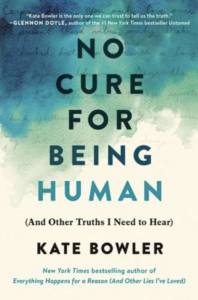
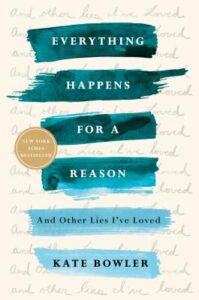
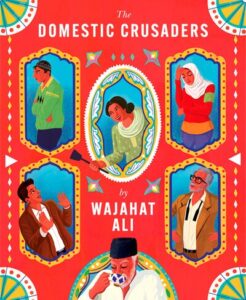
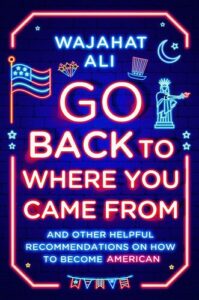
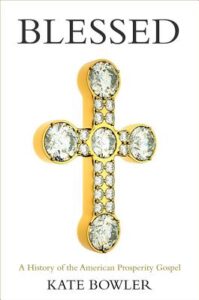
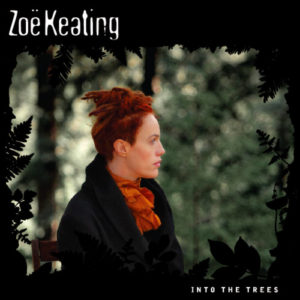
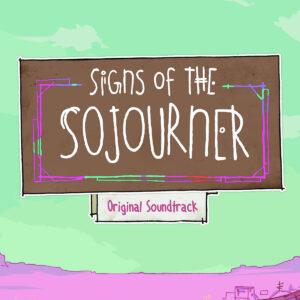

![Cover of Sun, Cloud / Night, Cloud [2 CD]](https://m.media-amazon.com/images/I/41Y7krbmjdL._SL500_.jpg)
